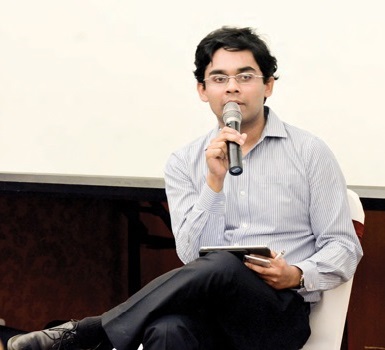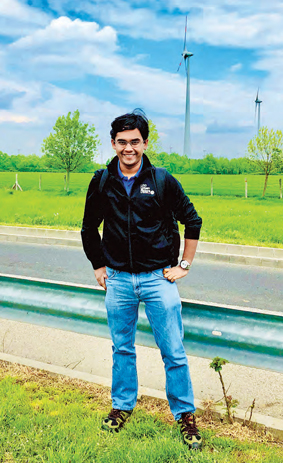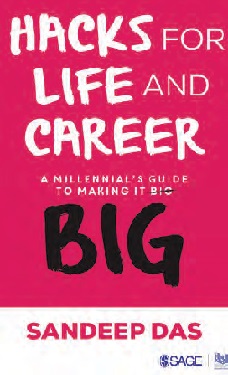Firing On All Cylinders

Sandeep Das, Global Foresight Lead, Emerging Countries, Mars Wrigley, has been a corporate leader for over 12 years, having worked as Director at PwC, Accenture Strategy, Marico & BCG. As part of his work, he has had short stints across New York, Kuala Lumpur, Manila and Jakarta. In his current role, he is responsible for identifying and deploying futuristic business models and consumer paradigms across emerging countries.
He is an avid writer with three successful books - ‘Hacks for Life and Career: A Millennial’s Guide to Making it Big’, ‘Yours Sarcastically’ and ‘Satan’s Angels’. His books have been featured in Fortune, Times of India, Economic Times, Mint, Deccan Chronicle, Business Line, Asian Age, CNN IBN, Hindu, Mid-Day, etc. ‘Hacks for Life and Career’ is an Amazon tagged best-seller and has reached #1 in Amazon Hot Trending List and #2 in Amazon Business Best Sellers list. He has been called one of India’s most influential writers by Entrepreneur magazine.
He has been invited as a guest speaker at 100+ leading corporates and institutes. Some of the institutes Sandeep has spoken at are NUS Singapore, IIM-B, IIM-C, IIT Bombay, St. Stephen’s Delhi, IIT Madras, IIT Delhi, BITS Pilani, LSR Delhi. He has spoken at corporates like the Tata Group, Indian Oil, Bajaj Electrical, Accenture, Tata Consultancy Services (TCS), Deloitte, upGrad, etc. Corporate honcho, writer, thought leader: Sandeep has done it all at a very young age. What drives him and other young corporate leaders like him in today’s scenario, and what insights can he share from his experience? A freewheeling discussion with the young achiever.
"What IIM did specifically was that it trained you with this mind-set that you can do many things at one go. It teaches you the art of time management so that you balance multiple things and be successful in them. IIM’s ecosystem is built in such a way that you will figure out a way to manage your time."
- Sandeep Das
Corporate Citizen: You are presently working at Mars Wrigley, what exactly do you do? Could you define your responsibility?
Sandeep Das: Mars Wrigley, located in the USA, makes chocolates, brands like Sneakers, MARS, MnM, Twix, Galaxy and so on. I lead a function called Foresight which is a long-term strategy for the company. I look after a geography called Emerging Country-Asia, Africa, South America.
CC: Could you go back to your college days at IIM? What did this premier institute teach you?
What an MBA at an IIM typically does is you actually learn a lot from your peers. Your peers are very smart as they come from different backgrounds. Through the interaction you pick up small things. Also, what IIM did specifically was that it trained you with this mind-set that you can do many things at one go. It teaches you the art of time management so that you balance multiple things and be successful in them. IIM’s ecosystem is built in such a way that you will figure out a way to manage your time. Obviously, the brand helps, the education helps
"In my first job, I had a lot of these interesting experiences which forced me to write. When I joined consulting, I was in Uttar Pradesh the first four months. During that time, I saw the length and breadth of UP. For someone like me, coming from the urban setup of central part of Bengaluru, it was such an eye-opening exercise".
CC: Apart from peer-to-peer learning could you tell something about academics that have sharpened your intellect or made you go forward?

The curriculum is extremely good; it is a world class institute. The curriculum has the right amount of break, learning and teaching.
CC: What was your first job?
I got placed in the FMCG sector in a company called Marico. I joined as a management trainee. For my first year I was travelling all over the country - Punjab, Haryana, etc. Then I came to Mumbai, led a good life there. I stayed there for a year and I moved on to consulting.
CC: Tell us about the rural population as consumers? What has changed?
There is a lot of similarity and a lot of difference. When I first visited a village, I was very surprised that the Sarpanch of the village had so much influence in a village. I wouldn’t be wrong to say that a Sarpanch was more influential than Amitabh Bachhan or Sachin Tendulkar during that time. A Sarpanch is more powerful, unlike where you and I come from, where a cricket or a Bollywood celebrity is more powerful.
Also, if your neighbour buys a tractor, it is highly likely that you will also buy the same brand of tractor. The feeling of community is something which shocked me straightway. The second thing which struck me was that people in rural India might not have the means, but they have a big heart. For example, I was in a bus to Patiala. A lady who was about my mother’s age, probably not well to do, was having a chat with me. She was asking things like ‘where are you from?’ and so on. And she insisted on paying my bus ticket and offered me her seat too. She said you have come to our part of the world and hence the hospitality. The generosity is striking, I don’t think this could happen in urban India.
In terms of what is similar, may be the aspirations, they want a good mobile phone, good lifestyle and want high-end jobs. There is a lot of money now in rural India. As monsoons have been good in the last two to three years the farmers have a lot of money. Rural India is growing very fast, because of the money coming there now.
"The second big difference is the mind-set. For the CEO, work is everything in life and his identity is driven by his work but for the 30-year-old work is just one of the many things in life-someone might be a biker, someone might be a photographer"
CC: As you said a Sarpanch is very powerful, does he also influence what people buy?

Absolutely. Certainly ten years ago his voice mattered a lot. Maybe rural India is changing now.
CC: So would you approach them first?
Yes and no. I know some companies would have a marketing campaign with a Sarpanch. It depends on the product that you are selling. If you are targeting a 20 -year-old, then he or she will not listen to the Sarpanch. If it is a product like a tractor which is their source of livelihood, I think a Sarpanch’s view matters a lot.
CC: You are an author of several books at this young age. What inspired you to write, was it an innate talent?
It was not an innate talent. I never have been formally trained, nor I have written formally in school or college. In my first job, I had a lot of these interesting experiences which forced me to write. When I joined consulting, I was in Uttar Pradesh the first four months. During that time, I saw the length and breadth of UP. For someone like me, coming from the urban setup of central part of Bengaluru, it was such an eye-opening exercise. UP is India’s biggest state, works so differently-I started to capture some of the experiences in a book. I enjoyed the process, it was a wonderful experience.
CC: What was different in UP?
UP is very different. The one thing that struck me was that people there were politically so knowledgeable. Whether it was the auto rickshaw driver, or a shopkeeper or a farmer, they knew the latest in politics. I think UP is the most politically aware state in India. I have travelled across the country; I have never seen an auto rickshaw driver or a farmer be so well-versed with political happenings like I saw in UP. The second thing which struck me was that it was like a million Indias within UP—the way people talk within Lucknow is so different from Kanpur which is only 100 km away. I had gone for dinner at some friend’s place in Lucknow, they were so polite and so nice. I took a flight to Gorakhpur to visit a village called Basti. I went there for the first time to meet somebody and he welcomed me with a gun. In one day, you see so much difference in UP. The first time I went to Allahabad, I went to Amitabh Bachchan’s house.
And that’s how I started writing; my first book did decently. But once you write one book, you get addicted. I wrote the second one, then the third one-my fourth is coming out in December.
CC: Which is your first book?
My first book is titled ‘Yours Sarcastically’. It portrays a sarcastic take on modern day people.
CC: After Covid, as a young professional, what differences did you see in corporate culture, employer-employee relationship and the issue of going forward, before and after.
One thing that has changed is the way you work. Earlier, face time was important. I was in consulting, where client face time was important for us. Now, face time is not so important, people are working over Zoom calls. That is something that has changed. The other big trend you see across the world is how people are evaluating their role as employees. In the US, you see the great resignation, 4-5% of the workforce has left. People who have seen death in the family, parents, grandparents, etc. they are re-evaluating their role in their lives. And that question is always there - what is my employer doing for me? Something that you are seeing in Corporate India also. Earlier it was, what can I give to the company? Now the question is, what am I getting in return? That is a big mind-set shift that has happened.
The other thing that has happened is people are ready to walk away from glamorous careers. There is a top-tier consulting firm, big recruiters from IIMs-very fashionable company to work for. In 2020, they hired 25 people from IIMs and ISB. In six to nine months, 24 of them quit. Never in history has this happened. It just tells you that people are ready to move away from glamour, questioning their life choices, and the notion of ‘Am I going to be happy’ has become more important. And everyone is questioning, ‘what are you going to do for me?’. Before Covid the status was, ‘What can I do to add value to the organisation’.
CC: Do you think employers in India have taken this kindly? Or they just had to?
They did not want to do it willingly; it was forced on them because the economy is recovering very fast now. Everyone is quitting, everyone is paying money-I think they had to do it because it is a market necessity. You must have heard in the news, Infosys has an attrition of 28%, TCS is losing people. They have had to do it, more than they wanting to do it. If you see during 2020 when the lockdown had just started, Maharashtra was one of the worst affected states in India. So many companies laid off people although they had cash. It was not the intent of the companies; it was just that they had to follow it so that they keep the talent.
"People are ready to move away from glamour, questioning their life choices, and the notion of ‘Am I going to be happy’ has become more important. And everyone is questioning, ‘What are you going to do for me?"
CC: As a youngster, do you like the shift, and have your priorities changed? And how do you like it or not to be an employee of today?

In my case, the shift has happened in my mind-set-I do switch off at particular times. I do go running every morning-I do all of that.My current employer is very good, they encourage holistic wellness, I am happy with that and my mind-set has changed in terms of what I want to do. Also what happens is, once you work for a few years, you become financially sustainable so then the role of money in your life starts going down, and then you start questioning other things in life—I think that is natural. Once people cross the age of 30, they are financially okay and that is when they question these things.
CC: Health has gained much importance. Were you a fitness freak earlier too? Or has it changed? Tell us about your peers too. And how companies are investing in wellness?
I used to do a bit of running. But it has significantly increased after the pandemic. For my peers, whom I know, they definitely understand the importance of physical health-at least, eating the right food, getting in shape, going for a morning walk, all of this has gone up. What we are seeing in India is that the emphasis of mental health is going up slowly. It is still taboo to say I am mentally unhappy, I am depressed. But in the big cities, it is okay to open out. What companies are doing is that they are encouraging topics on mental health. There are companies who say that if you want to take two-months off and relax in life, please go ahead. Earlier, it was suicidal to say that-the earlier generation would know this-for two months, you are going to Ladakh to refresh, you would have had to say bye-bye to your job. Now, it is acceptable. The openness to take a break has come in. Companies have insurance policies; good infrastructure. Now there is some sensitivity coming in that you do not trouble employees over the weekend. If it is a lady with young children, do not disturb her after 6 pm. How else can we help her, can we give her access to a nearby crèche? Some of these sensitivities are slowly coming in, but to be honest, there is still a long way to go.
CC: How do you foresee the situation, are we going to have a hybrid corporate culture or go back to the physical? What is your assessment?
Multiple things will happen, if you see what is happening in the USA-we typically follow the USA-we had companies who said come to office three days a week, work from home two days a week. Some companies said come to work all five days a week, like with investment banks. Tech companies said come three days a week. There are some companies like Airbnb who said work remotely all five days of the week. If you see, there is a huge backlash against companies that are forcing employees to come to office. India is not far behind the US. There are some IT companies saying come to office five days a week. That will not help, as there is huge attrition. Somewhere down the line, there will be a flexible system, but a flexible system doesn’t work unless the head of the company fundamentally has trust. If he says that if I cannot see people’s faces, they are sleeping at home-it doesn’t matter if there is flexible infrastructure because the culture will permeate down. Only when the CEO believes that he can trust his people, will it work. In India it is difficult, it will take ten years I think. It is only then that things will improve. In India, I definitely see more and more companies saying, come five days a week.
CC: Is there a generation gap between CEOs and the majority of employees?
I will not generalise, for a large set of people it is there. For instance, if a 50-year old is leading a firm with a lot of people in the late 20s, for the 50-year-old, working for a big brand, getting a good salary was a measure of success in life, and most likely, that person came from a humble background. For someone who has seen the Emergency in India—that’s the culture. On the other hand, the 20-year-old employee today - his parents have been well-off, he has grown up in a neighbourhood like Koregaon Park, he has access to money. For him, life is very different. To him, the role of money, the role of the job and the role of the brand is very different. For the 50-year-old CEO the role of the brand is huge but for the 30-year-old, the role of the brand is very different. What happens is that the CEO tries to incentivise the role with money, but to this person the incentive of money may not work. So that is one big difference.
The second big difference is the mind-set. For the CEO, work is everything in life and his identity is driven by his work but for the 30-year-old work is just one of the many things in life-someone might be a biker, someone might be a photographer. Work is one third of his life. This is the gap that people don’t understand. How this plays out is that the CEO believes that you should work on the weekend, the youngster will say no, I have to go to trekking this Saturday. How this aggregates is that the CEO may say let me sign a bond saying you cannot leave my company for three years, and the youngster will think he is being imprisoned, and then things get worse.
"The Indian economy is a very strong one. I don’t think many people understand that very well. It is the economy that is being driven by 60% consumption.

CC: You also do literary festivals. When do you get the time and how do you do it?
It is a skill-set that I learnt at IIM, you can manage everything and manage your time. In my mind, what I do is, when I start something, I give myself two hours. In two hours I will do my best. I set myself a fixed time and within that I do the needful. It is a habit that I have cultivated.
CC: You mentioned about the Indian economy, coming back and growing. Which are the sectors that are moving ahead? Has the post-Covid scene made certain sectors dull and have new sectors come up?
The Indian economy is a very strong one. I don’t think many people understand that very well. It is the economy that is being driven by 60% consumption. The sectors which will do better going forward are tech, IT, and product services. Consumer goods that sells FMCG, tractors, auto, retail apparel, and anything that has a rural focus will do extremely well. Pharma, especially what was being done out of China will do extremely well. Most industries in India will do very well. The Indian economy over the next 10 years will break all records. Indian economy will stand out in many different areas.
CC: What do you think about the travel sector? Not only in terms of business but also to you, as a youngster, has the travelling philosophy changed post-Covid?
During Covid, I would say yes. Our vacations had become Goa, Kerala, etc. Now, we are going to the good old days. We are also planning vacations to the earlier places like Europe, etc. Even flight numbers are coming back on track. Post-Covid, we will go back to 2019 and there will not be any change. People will start business travel in a few months.
CC: Tell us something about your family.
I come from a Bengali family. Grandparents, parents, cousins, friends. I am not married.
CC: What is your take on marriage?
It should happen when two people agree.